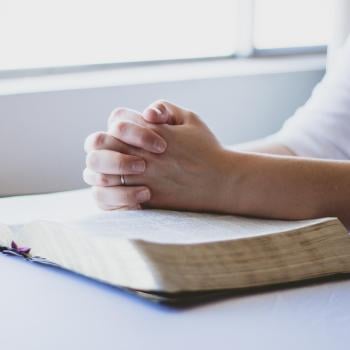
Monday: Read Matt 16:1-20
The passage begins with the Pharisees and the Sadducees asking for a sign (1). They were primarily concerned with whether Jesus was claiming to be the Messiah. If He was, this was a matter of serious concern for them. They would have to give an account to Rome. Thus, they needed to decide if they were going to back Jesus or not. Of course, their concerns were self-centered. They did not like Roman rule. But, and this is especially the case with the Sadducees, as those whom Rome had put in charge to rule over Judea, they benefitted from Rome’s rule.
Jesus responds that none will be given; except the sign of Jonah (4; cf 12:38-40). If they would not believe all His previous work, then it is presumptuous to suppose that one more miracle would be sufficient (cf. 11:21-24)
Jesus warns of the “leaven”/yeast of the Pharisees and Sadducees (6). Leaven was a small batch of dough leftover to make the next week’s bread (cf Gal 5:9; 1 Cor 5:6-8). Jesus and Paul use leaven to refer to the corrupting influence of false teachings. In this case, false teaching refers to the corrupting influence of those who want to compromise with the powers of the world in order to minimize or eliminate suffering and persecution.
Jesus then brings them to Caesarea Philippi near the base of Mt Hermon (far north). As in Mark (8:27-29) and Luke (9:18-20), Jesus asks, “Who do the people say that the Son of Man is?” (13). The disciples’ reply is the same as in Mark except Matthew includes “Jeremiah” (14; Mark had said “one of the Prophets”). Matthew’s addition of Jeremiah perhaps is because Jeremiah’s ministry also included the demand for repentance. In addition, both Jesus and Jeremiah spoke words of judgment against Jerusalem and suffered for doing so (see Jer 7).
Peter’s confession and Jesus’ affirmation of Peter has been the source of much controversy. Many view Matt 16:18 as either having a Catholic interpretation (Peter is the rock on which Jesus is building His church) or a Protestant interpretation (Jesus is the rock).
The argument that it is Jesus is based on 7:24-25 as well as the affirmation that Jesus is the cornerstone of the new Temple (21:42). The argument that Peter is the rock is more tenuous in that Peter’s name in Greek (“Rock”) is masculine in form and Jesus’ affirmation that He will build His church “upon this rock” is the feminine.
I would suggest that perhaps it is neither of these. Jesus’ mention of “this rock” may be a reference to the geographical rock (at the base of Mt Hermon) upon which they were standing. That Matthew and Mark both place this exchange in “Caesarea Philippi” (13; Mark 8:27), which is at the base of Mt Hermon, has led some to note that this was the location of the “gates of Hell” in some Jewish literature (e.g., 1 Enoch 6:1-6 this is where the Sons of God descended [cp Gen 6:1-4]). Was Jesus saying, “Here, at the ‘gates of Hell’ is where I will begin the building of my church and even the ‘gates of Hell’ will not stop Me?” Note: the “gates of Hell” are defensive and not offensive. It is not that the “gates of Hell” will threaten to advance and defeat the Church, but that the Church will advance, and the “gates of Hell” cannot stop it.
Regardless of what we think of this, we can all at least agree that Jesus is the foundation of the Church!
Questions to ponder/discuss:
- How often do we demand “signs” from God? Is your faith stronger when God answers a prayer request, or you “see” Him working in your life? This is natural and somewhat to be expected. The danger is what happens when God doesn’t seem to answer your prayers? Or God doesn’t appear to be working in your life? What do you do when God seems silent? Pray that God would increase your faith so that you remain strong in your convictions even when He seems absent (He of course is never absent—Matt 28:20. It is merely our perceptions).
Tuesday: Read Matt 16:21-17:13
As in Mark 8, Jesus explains that He is the Christ and that He will suffer (17, 21). And, as in Mark, Peter rebukes Jesus: “Peter took Him aside and began to rebuke Him, saying, “God forbid it, Lord! This shall never happen to You” (22)—”this is not the kind of King we are expecting and perhaps that we even want!” Matthew adds to Jesus’ reply to Peter the statement, “You are a stumbling block to Me” (23).
NB: this may be used to question the notion that Peter is the “rock” upon which Christ is building His Church. Peter is a stumbling block.
Matthew also adds, “For the Son of Man is going to come . . . and will then repay every man according to his deeds” (27). Matthew is reminding us of the human proclivity towards deeds that eliminate suffering instead of deeds that confront suffering and persevere through it.
Matthew 17:1-13 depicts the Transfiguration of Jesus (Matt, Mark, and Luke all place this event after the confession of Jesus). Matthew adds to Mark’s account (which is quite strange because Matt’s account is almost always shorter than Mark’s) that the Father also says, “with whom I am well-pleased” (5). The quote comes from Isa 42:1, which is about the suffering servant.
The presence of Moses and Elijah (3) likely indicates that the entirety of the OT witness is pointing to Jesus (Moses represents the Law [Gen-Deut] and Elijah, who is often considered as the first prophet—i.e., the forerunner to the prophets—represents the rest of the OT witness).
Questions to ponder/discuss:
- Jesus’ rebuke of Peter, “You are a stumbling block to Me” is an incredibly damning statement and one that we should not gloss over lightly. Regardless of your views toward Catholicism, Peter was the leader of the 12—that is why He took the initiative to rebuke Jesus. Jesus may be the Rock, but He is still building His Church through His people. And this begins with Peter and the 12 and it continues through us today. How often have we been a stumbling block to the work of the kingdom? How often is the Church a stumbling block? Pray for the global Church today: that God would purify it; that God would revive it; that God would help those that have to support those that do not; and that the Church may be one.
Wednesday: Read Matt 17:14-18:14
The stories that follow the confession of Jesus and the Transfiguration may seem random and unrelated. Be assured that the Gospel writers were literary geniuses, and nothing was random. Jesus has affirmed His Messianic identity and explains that even the “gates of Hell” cannot withstand the coming of the Kingdom. Yet, the disciples are unable to cast out a demon (16-18). The disciples could not cast out the demon “Because of the littleness of your faith” (20).
Then, in 17:22, Matthew again records Jesus’ prediction that He will suffer, die, and rise again on the 3rd day.
This is followed by the question of tax-paying (this is a different account than what we find in Matt 22:15-22, Mark 12:13-17, and Luke 20:19-26). This “two-drachma” tax (24) is also known as the “temple tax” (see Exod 30:13). One might think that paying a tax prescribed in the OT to the temple and not to the Romans would be acceptable to Jesus. This reasoning, however, fails to recognize that Jesus is the new temple.
Note: this tax only increased the burdens on the average Israelite. They were paying taxes to Rome (which was more than enough of a burden) and to their own temple establishment.
Jesus has them acknowledge that such taxes are paid by “strangers” (25)—i.e., subjects of Rome and not Roman citizens. Since Jesus is indeed a “son” of the kingdom, He should be exempt. He pays anyways (26-27): God provides the payment in the mouth of a fish.
Finally, in Matt 18:1-14, Jesus explains that in His kingdom the least are the greatest.
Questions to ponder/discuss:
- Why do you suppose that so many see so little evidence of the advancing of the kingdom today? (discuss)
Thursday: Read Matt 18:15-19:15[1]
Matthew 18-20 addresses relationships within the community. Matthew begins with conflicts within the community (15-20). The language of “binding and loosing” (18:18) may refer to the authority to interpret the law and to apply it in a given situation. Jesus, since He is the “Immanuel” (20; cf 1:23), now grants that authority to the Church—i.e., those who gather “in My name.”
Peter asks if forgiving someone seven times is enough? (21)—the Rabbinic maxim was three. Jesus’ reply may be read as either 70 times 7; or 77 times.[2] Either way, He likely means, “without limit.” That this is the case is supported by the parable that follows.
In the Parable of the unmerciful servant (22-35), we learn that the Church should have mercy towards each other just as God has been merciful to them. Note: this parable intentionally follows the question of forgiveness.
The danger here is that we too often read such passages in terms of personal forgiveness and personal spirituality. Jesus was likely addressing economic factors of actual debts that needed to be forgiven in order that land and possessions might be restored. The Parable of the unmerciful servant surely indicates that monetary and land matters were at stake.
In 19:1-15, Matthew sets forth for us how relationships are to function in the kingdom of God. Jesus responds to the Pharisees’ question about divorce by insisting on the sacredness of marriage as it was intended in creation. Husbands and wives are “one flesh” (5-6; citing Gen 2:24). The Pharisees respond by asking why Moses “commanded” the husband to give a certificate of divorce? (7). Jesus responds by noting that Moses did not command but only “permitted” divorce (8).
At this point, you might wonder what this has to do with the nature of the kingdom? The answer is that divorce not only violates the created order that God has established and that Jesus is restoring, but it also has unjust social and economic effects on the wife. This is the very thing that Jesus has commanded against: “whoever causes one of these little ones who believe in Me to stumble, it would be better for him to have a heavy millstone hung around his neck, and to be drowned in the depth of the sea” (18:6).
Matthew does add, what Mark omits, a provision in which divorce may be acceptable in the context of immorality (8). Note the focus of this provision, however, remains on the sin of the man who divorces for any other reason.
Questions to ponder/discuss:
- What do you suppose is the answer to the disciples’ question: “who is the greatest in the kingdom of heaven?” (18:1). Be careful not to answer too quickly: the answer might be far more profound than you may have thought.
- It is so easy for us modern westerners to personalize and spiritualize this section of Matthew. We tend to think that as long as I forgive others, I am good. But Jesus is going way beyond this. He is talking about establishing a community that brings about just relationships in which the “little ones” are given a status equal to the others. Reflect on what this might look like in the Church and in society.
Friday: Read Matt 19:16-30
Matthew, as with Mark, includes an encounter between a young man (20) and Jesus (Luke says he was a ruler; 18:18). Again, note the connection of this episode with what we have seen the previous few days. This man is a negative example of how the community of God’s people are supposed to act.
Jesus responds by citing 5 of the 10 commandments and He adds the Levitical provision “love your neighbor as yourself” (Lev 19:18-19). The man believes that he has done these (20). Jesus exposes the fact that he has not by asking him to sell his possessions, give them to the poor, and follow Jesus (21). The man leaves grieving because “he was one who owned much property” (22). The man may have believed that he had kept the commands, but Jesus exposes the fact that he had not kept the Levitical provision since the only way one could own “much property” is if he acquired it at the expense of someone else. “A persistent thread in prophetic traditions is that the wealthy have more because they have exploited the poor (Isa 10:1-3; Ezek 22:6-31; 34:1-22; Amos 5:10-12).”[3]
The man’s problem is that he had not forgiven his neighbor 70x! If he did, he would have restored their land to them.
Jesus then affirms that the disciples will “sit on twelves thrones, judging the twelve tribes” (28). The nature of such rule, however, stands in marked contrast to the rule of the nations. In the Kingdom of God, “the first will be last, and the last, first” (30).
Questions to ponder/discuss:
- Again, we are confronted with a text that steers in a direction that is contrary to the way we have always been taught. Sure, we can apply these chapters to our personal piety. But we cannot stop there. Jesus’ kingdom brings redemption and restoration to the creation. When we see poverty and great wealth, we must note that this is not what God intended. How might you work towards God’s restoration?
- Make it your aim to live as though you were last today. Consider everyone you meet as greater than yourself. At the end of the day, write down how you did. What kinds of situations proved especially difficult?
[1] Notes for today’s and tomorrows’ lesson are heavily indebted to Warren Carter, In the Shadow of Empire: Reclaiming the Bible as a History of Faithful Resistance (Kindle Location 1749); and Carter, The Roman Empire and the New Testament: An Essential Guide, Abingdon Press, 95.
[2] See the translations.
[3] See Carter, The Roman Empire.















